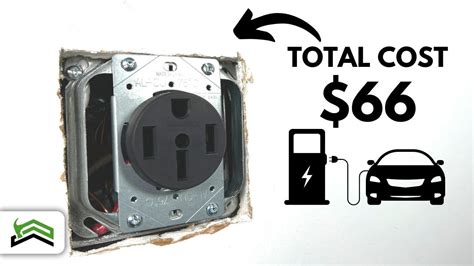240V Outlet Costs: Location, Location, Location
Installing a 240V outlet, crucial for high-power appliances like electric ranges, dryers, and hot tubs, is more than just plugging in a wire. The cost significantly depends on several factors, and "location, location, location" is a key mantra. This article will break down the various elements influencing the final price, helping you budget effectively for your project.
What Factors Determine 240V Outlet Installation Costs?
The cost of installing a 240V outlet can vary widely, ranging from a few hundred to over a thousand dollars. Several factors contribute to this price fluctuation:
1. Distance from Existing Electrical Panel:
This is perhaps the single biggest cost driver. The further the new outlet is from your electrical panel, the more wiring material is needed, and the more labor is involved in running the conduit (the protective tubing for the wires). A short run might only add a few hundred dollars, but a long run across multiple rooms or even outdoors could easily add several hundred more.
2. Type of Wiring Required:
Existing wiring within your walls and the type needed for the new 240V outlet impact cost. If your home uses older wiring or requires upgrading to meet current codes, the expense will increase considerably. Replacing outdated knob-and-tube wiring, for example, is a substantial undertaking.
3. Wall Type and Accessibility:
Installing an outlet in a drywall wall is significantly cheaper and easier than cutting through brick, concrete, or other dense materials. If the path to the electrical panel requires navigating obstructions or complex wall structures, the labor costs will escalate.
4. Number of Outlets Required:
Installing a single 240V outlet is cheaper than installing multiple outlets. If you need several outlets for different high-power appliances, expect a corresponding increase in the overall project cost.
5. Permits and Inspections:
Obtaining necessary permits and scheduling inspections are essential for legal and safe installations. These costs vary depending on your local jurisdiction, but they add to the overall expenses.
6. Electrical Panel Upgrades:
Sometimes, your existing electrical panel may lack the capacity to handle an additional 240V circuit. In such cases, you'll need a panel upgrade, which involves significant costs, possibly exceeding the cost of the outlet installation itself.
7. Labor Costs:
Labor costs vary depending on your location and the electrician's experience. Highly skilled and experienced electricians naturally command higher hourly rates.
People Also Ask (PAA): Addressing Common Questions
Here are answers to frequently asked questions about 240V outlet installation costs:
How much does it cost to install a 240V outlet for an electric stove?
The cost to install a 240V outlet for an electric stove depends heavily on the distance from your electrical panel and any necessary wiring upgrades. Expect to pay anywhere from $300 to $1000 or more.
Is it cheaper to install a 240V outlet yourself?
While attempting a DIY installation might seem cost-effective, it's strongly discouraged. Improper wiring poses significant fire hazards. The potential costs associated with rectifying DIY mistakes far outweigh any initial savings. Always hire a licensed and qualified electrician.
How much does it cost to add a 240V outlet to a garage?
Adding a 240V outlet to a garage follows similar cost factors as other locations. The distance from your panel and the type of wiring needed heavily influence the price. Garage installations often involve outdoor wiring, potentially increasing the overall expense.
How much does it cost to run a 240V line to a hot tub?
Running a 240V line to a hot tub usually involves significant cost due to the exterior wiring and the need for weatherproof connections. Expect costs to be at the higher end of the range, possibly exceeding $1000 depending on distance and other factors.
Conclusion: Planning Ahead for 240V Outlet Installation
Understanding the various factors impacting the cost of a 240V outlet installation is crucial for budgeting and planning. Always obtain multiple quotes from reputable, licensed electricians. By considering factors like distance from the panel, wiring requirements, and potential upgrades, you can accurately estimate the project cost and avoid unexpected expenses. Remember, prioritizing safety and professional installation is paramount.

